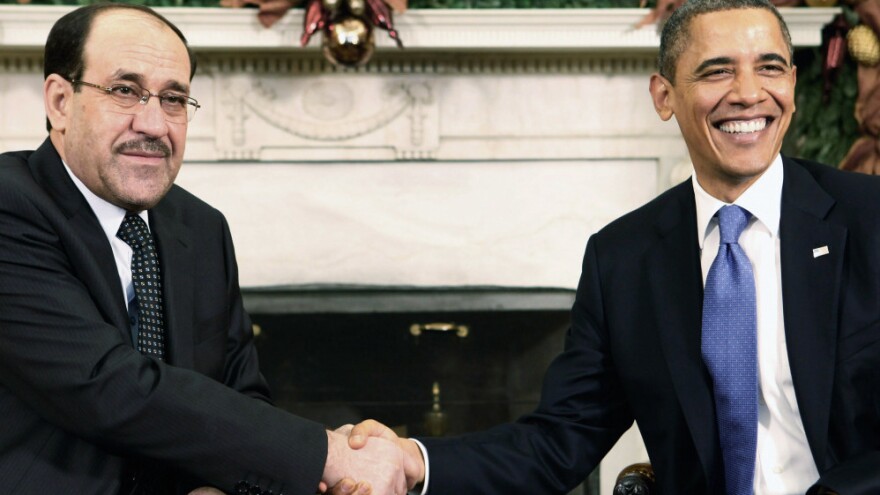President Obama and Iraqi Prime Minister Nouri al-Maliki met at the White House on Monday and pledged to maintain strong ties after the U.S. withdraws the last of its troops, but nagging concerns remain about Iraq's security and neighboring Iran.
In 2007, at the height of U.S. involvement, there were some 170,000 American troops fighting in Iraq. As part of his presidential campaign, Obama pledged to bring every last soldier home. It took a bit longer than he promised, but as he stood next to Maliki after their meeting Monday, the president was upbeat and optimistic about Iraq's future.
"We're here to mark the end of this war, to honor the sacrifices of all those who made this day possible, and to turn the page, begin a new chapter in the history between our two countries — a normal relationship between sovereign nations, an equal partnership based on mutual interests and mutual respect," Obama said.
Need For U.S. Help And The Iran Issue
In the past, the president referred to the conflict in Iraq as a "dumb war." On Monday, he sidestepped the question whether he still felt that way, saying history will judge the original decision to invade the country. Obama said the U.S. wants to build a more comprehensive relationship with Iraq, expanding trade and energy ties, among many other things.
Speaking through a translator, Maliki said Iraq will continue to need help from the U.S.
"[Iraq] remains in need of cooperation with the United States of America in the security issues and information and combating terrorism and in the area of training. And we want to complete the process of equipping the Iraqi army in order to protect our sovereignty," the prime minister said.
The U.S. will close all of its military bases in Iraq this month, but leave an enormous diplomatic presence of more than 15,000 people, which includes about 5,000 contractors, mostly for security.
Washington had tried to leave several thousand soldiers behind but decided to pull them all out after Maliki's government refused to grant them legal immunity. NATO announced Monday that it was withdrawing its troops by the end of the year, for the same reason.
Maliki says Iraq's security forces can handle internal threats. But it is regional security that is causing the most concern. More specifically, neighboring Iran may try to assert greater influence on Iraq in the wake of the American withdrawal.
President Obama said Monday that Maliki has shown that he will put Iraq's interests ahead of anything else.
"[Maliki] has shown himself to be willing to make very tough decisions in the interest of Iraqi nationalism, even if they cause problems with his neighbor," the president said.
Shaping A New Relationship
Still, as the clock ticks down on the U.S. withdrawal, talks are ongoing about how the two countries can continue security cooperation, without appearing to upset Iraq's sovereignty.
Michael O'Hanlon, a senior fellow at the Brookings Institution, says it's not clear how that new security relationship will look.
"We're going to have to figure out what kind of ongoing training presence they might want, because we might not be yet be able to provide them as much as they need; we're going to have to figure out with them if they want us to provide any over-the-horizon air power cover and what that might imply in terms of liaison officers on the ground," O'Hanlon says.
There has been talk of training Iraqi soldiers outside the country.
Obama said the U.S. would train Iraqi pilots to fly F-16 fighter jets that Baghdad purchased earlier this year, and he said there may be occasion for joint exercises and counterterrorism operations. And that, the president said, is no different from Washington's relationship with many other countries.
Copyright 2021 NPR. To see more, visit https://www.npr.org.




